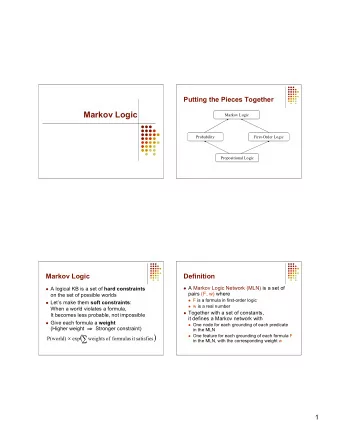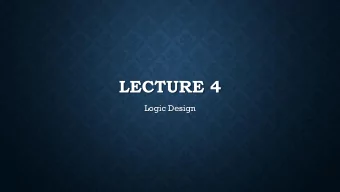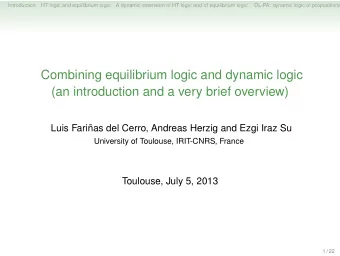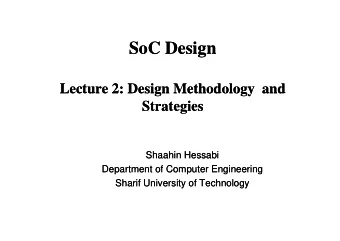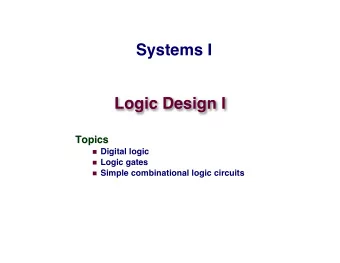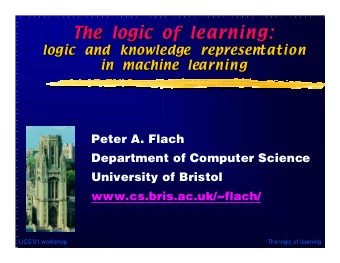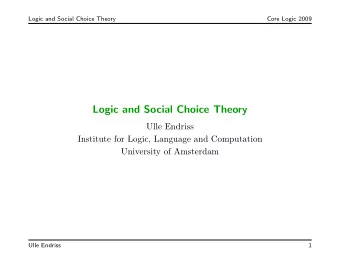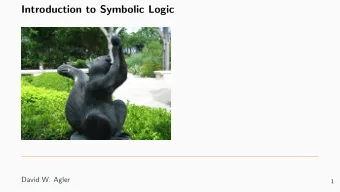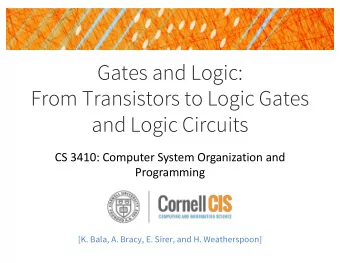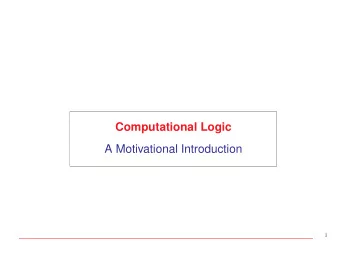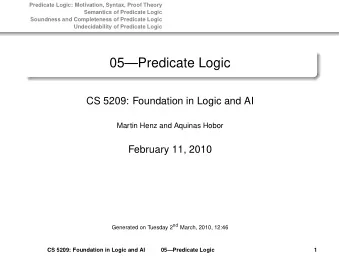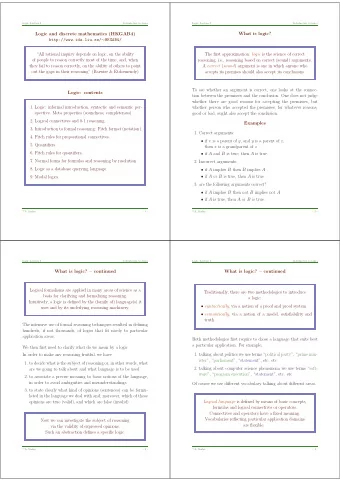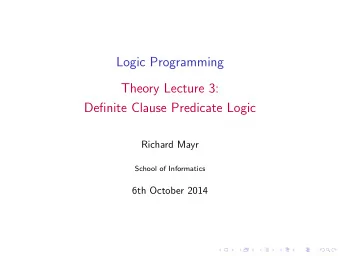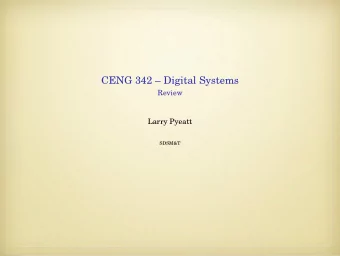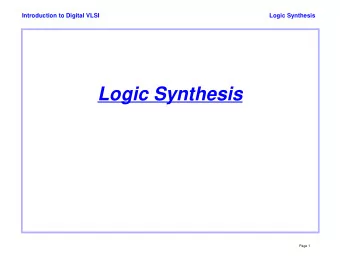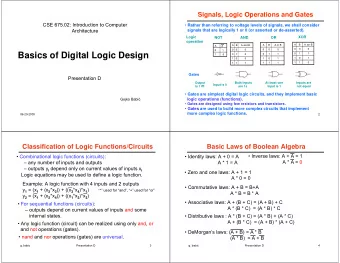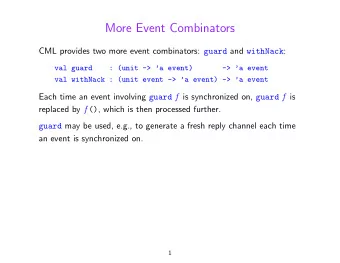
Lecture 7: Logic design Binary digital logic circuits: Two voltage - PowerPoint PPT Presentation
Lecture 7: Logic design Binary digital logic circuits: Two voltage levels (ground and supply voltage) for 0 and 1 Built from transistors used as on/off switches Analog circuits not very suitable for generic computing Digital
Lecture 7: Logic design � Binary digital logic circuits: – Two voltage levels (ground and supply voltage) for 0 and 1 – Built from transistors used as on/off switches – Analog circuits not very suitable for generic computing – Digital logic with more than two states is not practical Combinational logic: output depends only on the current inputs (no memory of past inputs) combinational . . input output . . . . logic Sequential logic: output depends on the current inputs as well as (some) previous inputs Inf2C Computer Systems - 2010-2011 1
Combinational logic circuits � Inverter (or NOT gate): 1 input and 1 output “invert the input signal” IN OUT input output 0 1 OUT = IN 1 0 � AND gate: minimum 2 inputs and 1 output “output 1 only if both inputs are 1” IN 1 IN 2 OUT 0 0 0 OUT = IN 1 . IN 2 IN 1 0 1 0 OUT IN 2 1 0 0 1 1 1 Inf2C Computer Systems - 2010-2011 2
Combinational logic circuits � OR gate: – “output 1 if at least one input is 1” IN 1 IN 2 OUT 0 0 0 IN 1 OUT = IN 1 + IN 2 OUT 0 1 1 IN 2 1 0 1 1 1 1 � NAND gate: – “output 1 if both inputs are not 1” (NOT AND) IN 1 IN 2 OUT 0 0 1 OUT = IN 1 . IN 2 IN 1 0 1 1 OUT IN 2 1 0 1 1 1 0 Inf2C Computer Systems - 2010-2011 3
Combinational logic circuits � NOR gate: “output 1 if no input is 1” (NOT OR) IN 1 IN 2 OUT 0 0 1 IN 1 OUT = IN 1 + IN 2 0 1 0 OUT IN 2 1 0 0 1 1 0 � Multiple-input gates: AND OR IN 1 IN 1 . . . . OUT OUT . . IN n IN n OUT = 1 if all IN i =1 OUT = 1 if any IN i =1 Inf2C Computer Systems - 2010-2011 4
Multiplexer � Multiplexer: a circuit for selecting one of many inputs i 0 i 0 , if c=0 z z = i 1 i 1 , if c=1 c i 0 i 1 c z 0 0 0 0 z = i 0 .i 1 .c + i 0 .i 1 .c + i 0 .i 1 .c + i 0 .i 1 .c 0 0 1 0 = i 0 .i 1 .c + i 0 .i 1 .c + i 0 .i 1 .c + i 0 .i 1 .c 0 1 0 0 = (i 0 + i 0 ).i 1 .c + i 0 .(i 1 + i 1 ).c 0 1 1 1 1 0 0 1 = i 1 .c + i 0 .c 1 0 1 0 1 1 0 1 “sum of products form” 1 1 1 1 Inf2C Computer Systems - 2010-2011 5
A multiplexer implementation � Sum of products form: i 1 .c + i 0 .c – Can be implemented with 1 inverter, 2 AND gates and 1 OR gate: i 1 z i 0 c � Sum of products is not practical for circuits with large number of inputs (n) – The number of possible products can be proportional to 2 n Inf2C Computer Systems - 2010-2011 6
Arithmetic circuits � 32-bit adder a 0 . . a 31 . 64 inputs → too complex for sum of s 0 . . s 32 . b 0 products . . b 31 . � Full adder: a b c carry sum a 0 0 0 0 0 carry(-out) 0 0 1 0 1 sum 0 1 0 0 1 b 0 1 1 1 0 c (carry-in) 1 0 0 0 1 1 0 1 1 0 sum = a.b.c + a.b.c + a.b.c + a.b.c 1 1 0 1 0 carry = b.c + a.c + a.b 1 1 1 1 1 Inf2C Computer Systems - 2010-2011 7
Ripple carry adder � 32-bit adder: chain of 32 full adders a 31 b 31 c 31 a 1 b 1 c 1 a 0 b 0 c 0 . . . 1 bit full-adder s 32 s 31 s 1 s 0 – Carry bits c i are computed in sequence c 1 , c 2 , … , c 32 (where c 32 = s 32 ), as c i depends on c i-1 – Since sum bits s i also depend on c i , they too are computed in sequence Inf2C Computer Systems - 2010-2011 8
Propagation Delays � Propagation delay = time delay between input signal change and output signal change at the other end � Delay depends on technology (transistor, wire capacitance, etc.) and number of gates driven by the gate’s output ( fan out ) � e.g.: Sum of products circuits: 3 2-input gate delays (inverter, AND, OR) → very fast! � e.g.: 32-bit ripple carry adder: 65 2-input gate delays (1 AND + 1 OR for each of 31 carries to propagate; 1 inverter + 1 AND + 1 OR for S 31 ) → slow Inf2C Computer Systems - 2010-2011 9
Sequential logic circuits . . input output . . . . combinational . . logic . . . . . sequential . feedback . logic � Output depends on current inputs as well as past inputs – The circuit has memory � Sequences of inputs generate sequences of outputs ⇒ sequential logic Inf2C Computer Systems - 2010-2011 10
Sequential logic circuits � For a fixed input and n feedback signals, the circuit can have 2 n possible different behaviours (states) – E.g. n=1 → one state if feedback signal = 0 one state if feedback signal = 1 � Example: SR latch S Q q – Inputs: R, S q – Feedback: q Q R – Output: Q Inf2C Computer Systems - 2010-2011 11
SR Latch � Truth table: S R Q i S Q 1 0 0 1 q 0 0 Q i-1 0 0 1 q 0 1 0 u=unused 1 0 1 q q 1 1 u 0 0 1 0 1 0 1 Q R � Usage: 1-bit memory – Keep the value in memory by maintaining S=0 and R=0 – Set the value in memory to 0 (or 1) by setting R=1 (or S=1) for a short time S S Q=1 Q=0 R R Inf2C Computer Systems - 2010-2011 12
Timing of events � Asynchronous sequential logic – State (and possibly output) of circuit changes whenever inputs change input output � Synchronous sequential logic – State (and possibly output) can only change at times synchronized to an external signal → the clock input output clock Inf2C Computer Systems - 2010-2011 13
D flip-flop input D D output Q clock Q clock � Edge-triggered flip-flop: on a +ve clock edge, D is copied to Q � Can be used to build registers: D 3 D 3 Q 3 Q 3 D 2 Q 2 D 2 Q 2 4-bit register D 1 Q 1 D 1 Q 1 D 0 Q 0 D 0 Q 0 clock clock Inf2C Computer Systems - 2010-2011 14
General sequential logic circuit . . input output . . . . combinational . . logic . . . . Current Next state state signals Q m D m signals . . . . . . Q 0 D 0 clock � Operation: – At every rising clock edge next state signals are propagated to current state signals – Current state signals plus inputs work through combinational logic and generate output and next state signals Inf2C Computer Systems - 2010-2011 15
Hardware FSM � A sequential circuit is a (deterministic) Finite State Machine – FSM � Example: Vending machine – Accepts 10p, 20p coins, sells one product costing 30p, no change given – Coin reader has 2 outputs: a,b for 10p, 20p coins respectively – Output z asserted when 30p or more has been paid in Inf2C Computer Systems - 2010-2011 16
FSM implementation � Methodology: – Choose encoding for states, e.g S0=00, …, S3=11 – Build truth table for the next state s 1 ', s 0 ' and output z – Generate logic equations for s 1 ', s 0 ', z – Design comb logic from logic equations and add state- holding register s 1 s 0 a b s 1 ' s 0 ' z 0 0 0 0 0 0 a comb. z 0 0 1 1 0 0 0 b logic 0 1 0 0 1 0 1 0 0 0 1 0 S 0 ' S 0 1 0 1 1 1 0 0 S 1 ' S 1 1 1 0 1 0 0 clk Inf2C Computer Systems - 2010-2011 17
Recommend
More recommend
Explore More Topics
Stay informed with curated content and fresh updates.
